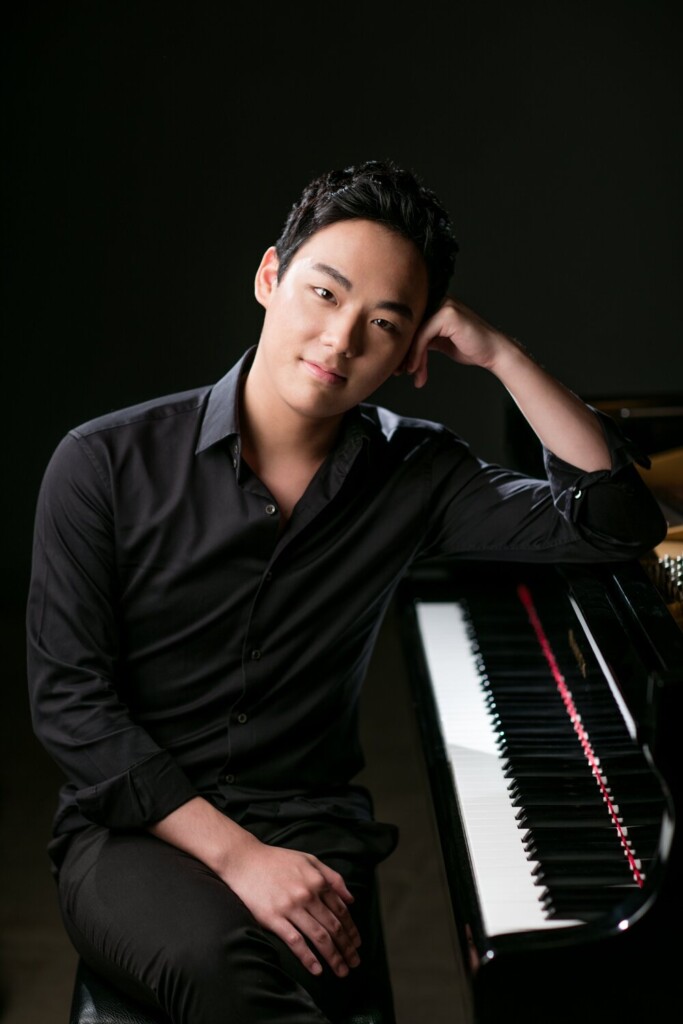A solo program featuring some of piano literature’s most famous fantasies is on deck this week as the Gina Bachauer International Piano Foundation, presents Changyong Shin in concert. Shin, who won the Bachauer competition gold medal in 2018, will play music by Mozart, Schubert, Granados and Liszt on March 10 at 7:30 p.m. at the Rose Wagner Center for Performing Arts.
It is almost three years to the day when Shin’s original concert as a Bachauer gold medalist was scrapped because of the COVID-19 pandemic. In 2021, Bachauer sponsored his recital at Carnegie Hall in New York City but, other than an appearance last summer with the Utah Symphony in Deer Valley, this is Shin’s first appearance in Salt Lake City since he won the competition at the age of 23.
Shin’s international competition record has been impressive. He took top honors in four international piano competitions within a two-year period. In addition to his 2018 gold medal at Bachauer, he won top prizes at the 2018 Rencontre Internationale des Pianistes Prix Zygmunt Zaleski in Paris, the 2017 Seoul International Piano Competition and the 2016 Hilton Head International Piano Competition.
Shin, 28, says news of his winning the Bachauer competition was highlighted in Korea, where he became a major music personality. As soon as concerts returned in 2020 in the performing arts calendar in and around Seoul, Shin was in hot demand. The Korean pianist is now living in Boston, where he is working on his advanced artist’s diploma at the New England Conservatory. He already had completed a similar program at Juilliard.
In an interview with The Utah Review, Shin says he considers this concert as part of an ongoing artistic journey where he sees himself as more mature in focusing on the emotional and visceral impact of the music he is playing. The Carnegie Hall recital in 2021 was the first concert he performed in the U.S. following a year of numerous concert appearances in his native Korea. “The Carnegie Hall concert convinced him to not just focus on improvement in performance but also to study more about what the music should be communicating,” he explains.
In his late twenties, he now thinks about the longer term in envisioning the next phase in his musical career. He moved to Boston in early 2022 and is now nearing the completion of his first year in the artist diploma program at the New England Conservatory. With life experiences as a more mature musician, Shin says he started thinking more about the imaginative storytelling and emotions in the music than about its virtuosic character. In Boston, he also enjoys teaching young students. He adds that he enjoys life in Boston even more so than in New York City, where he lived before the pandemic brought everything to a full stop. “The seafood is great and I believe the landscape in Boston feels younger and more passionate than in Philadelphia or New York City.” Shin says he will return to Korea for concerts at various times between May and September.
The first half of the program features works by Mozart and Schubert. The opener is Mozart’s Fantasy in C Minor, K. 396, which recently turned out to be a recasting by Maximilian Stadler of a fragment of a piece for piano and violin. According to Robert Levin, among the most respected scholars who have studied Mozart:
Constanze sold the autograph estate to the Offenbach music publisher Johann Anton André sometime around 1800. Maximilian Stadler was probably requested by Constanze Mozart to compose to completion some of the most worthwhile fragments – so that they even could be performed and hence better marketed. Stadler had in the process probably especially fallen for the c-minor fragment, since contrary to contract it was not among the autographs in the bundle André bought. Instead, Stadler kept the Mozart autograph, copied it and composed from it his extraordinarily successful piano fantasy. He presumably had no use for the few original Mozart violin measures in it. And he handed over his “co-creation” to the owner of the Mozart autograph in an especially noble gesture: The c-minor “fantasy” appeared in 1802 from the Viennese music publisher Cappi with a dedication to her – for Constanze’s 40th birthday, I assume.
Shin follows with Schubert’s Sonata in G Major, D. 894, which Robert Schumann considered the composer’s best, “perfect in form and substance.” The title page refers to the work which runs more than 35 minutes as a “Fantasy or Sonata.”
Shin offers shorter works to round out the second half of the concert. Los Requiebros from Goyescas, a piano suite that Enrique Granados completed in 1911. Inspired by paintings of Francisco Goya, the music is not specifically related to a single painting as it is to the Spanish ethos being represented in the artist’s body of work, which was created in the late 18th and early 19th centuries. This piece evokes the value of gallant conduct in a romantic relationship, as captured in elements of the jota dance. He follows this with two floral gems by Rachmaninoff: Lilacs, op. 21, no. 5 and Daisies, op. 38, no. 3.
The closing work is the money ticket bringing full circle of Shin’s journeys through musical fantasies with Liszt’s Réminiscences de Don Juan, which references Mozart’s opera Don Giovanni. While Bachauer audiences have been treated to magnificent performances of Liszt’s transcriptions, this work has a subtle yet significant difference, in that the title cites ‘reminiscences.’ Liszt no longer sees the eponymous character of the Mozart opera in a negative light as a licentious, flawed being but instead as a high-spirited unashamed romantic.
For tickets and more information, see the Bachauer website.


